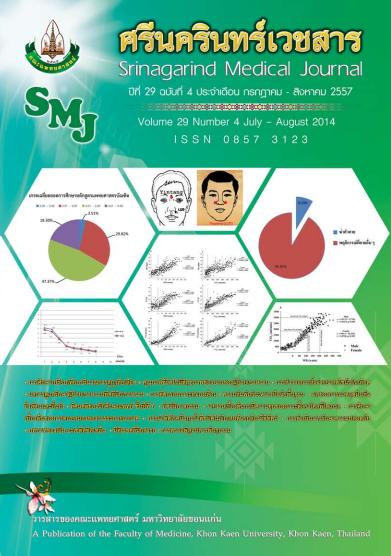The Prevalence of Clopidogrel Resistance in Reinfarction and Recurrent Myocardial Infarction; a Single-Center Preliminary Report
Keywords:
Clopidogrel resistance, VerifyNow P2Y12 assay, reinfarction, recurrent myocardial infarctionAbstract
Background and objective: Genetic polymorphisms leading to clopidogrel resistance was highly prevalent among the Northeastern population of Thailand; however, the magnitude of problem had never been evaluated clinically.
Methods: A preliminary analysis of a descriptive study was done among 56 patients who presented by reinfarction or recurrent myocardial infarction (MI) during clopidogrel therapy. Baseline clinical, laboratories, and procedural data were collected. Clopidogrel activity was assessed by a VerifyNow© P2Y12 assay (Accumetrics, San Diego, CA, USA) with a cut-off value of ≥ 240 P2Y12 reactivity unit (PRU) used as a criteria for clopidogrel resistance.
Results: Across overall patients, mean age was 64 years, 64% of patients were males, mean PRU was 227, and the prevalence of clopidogrel resistance was 50%. Twenty-four patients presented by reinfarction with mean PRU of 232, and 32 patients presented by recurrent MI with mean PRU of 224, and 62.5% of the former and 40.6% of the latter group had clopidogrel resistance (p = 0.25). Thirty-five patients had stent thrombosis (ST) or in-stent restenosis (ISR) with mean PRU of 231, and 21 patients had neither ST nor ISR with mean PRU of 221, and 57% of the former and 38% of the later group had clopidogrel resistance (p = 0.36).
Conclusion: Clopidogrel resistance is highly prevalent among patients with reinfarction and recurrent MI in the Northeastern of Thailand. Platelet function testing should be performed in such patients to further guide the P2Y12 inhibitor regimen.
Key words; Clopidogrel resistance, VerifyNow P2Y12 assay, reinfarction, recurrent myocardial infarction




